In bordertown Dandong, where the North Korea sanctions bite
The kitschy good times roll, across the river from North Korea.
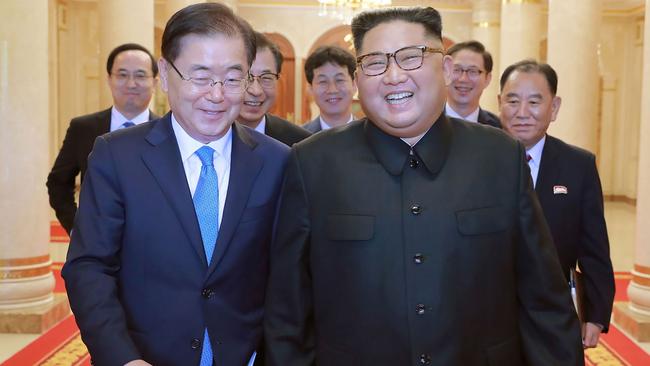
The all-female band from North Korea is finishing up its nightly entertainment in the Chinese border city of Dandong.
With images of China’s red flag on a video in the background and drums beating, the players sing a favourite Chinese song: “We are all Chinese. We stand up tall and hold our head high and let the world know, we are all Chinese.”
Wearing traditional Korean costume, the performers pull up audience members, mainly Chinese tourists, to form a conga line of dancers around the restaurant, finishing up all singing together on stage.
Would that improving ties with North Korea under dictator Kim Jong-un were that simple.
Kim plans a massive military parade on Sunday in his capital, Pyongyang, to celebrate the 70th anniversary of North Korea’s founding.
There is speculation about which world leaders will attend amid UN sanctions and complaints from US President Donald Trump that North Korea is dragging its feet on the denuclearisation promises Kim made in June at their Singapore summit.
Chinese President Xi Jinping, who has met Kim three times this year, has declined an invitation, believed to be concerned that appearing at what will be a massive military parade could send the wrong signal. Trump has accused China of failing to pressure Kim on agreements struck in Singapore.
It was announced in Beijing this week that Xi will send a special representative, Li Zhanshu, the third-ranking official in China’s Communist Party and chairman of the National People’s Congress.
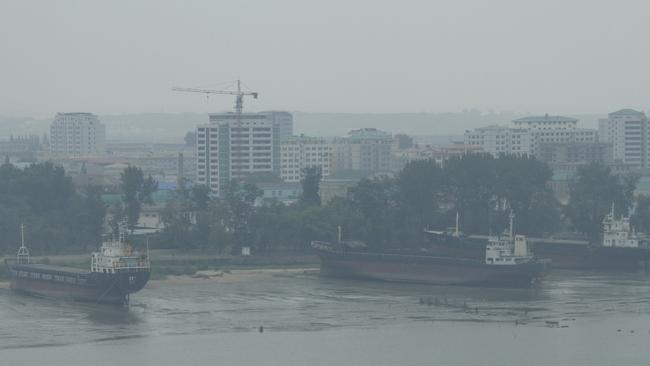
But in Dandong, once a thriving city on the Yalu River and the throughpoint for most of China’s trade with North Korea, tourism has overtaken business as one of the main sources of income, thanks to the UN sanctions.
The nightly shows by North Korean singers and bands in Korean restaurants create a surreal atmosphere in Dandong, which is swimming distance from Kim’s second-largest city, Samjiyon.
Tourists, including some from South Korea, have replaced most of the businessmen and officials from North Korea who used to populate its hotels and once fuelled a lively night-life.
Many waterfront restaurants have closed, but enough are still open to feed the tourists eager to peer across the mysterious border.
While the Friendship Bridge, a one-lane road and rail span across the river, is almost deserted these days, the tourists who flock to the river walk take selfies and don bright Korean clothes for more photographs.
They buy Korean kitsch, probably made in China, and enjoy boat rides, including speed boat trips to within metres of North Korea.
The cab drivers in Dandong complain that sanctions have hit all business in Dandong.
“It’s no good,” a Chinese businessman says over a Korean hotpot. Like everyone we spoke to during three days in the city, he did not want to be mentioned by name for fear of reprisals. During our drives around the city, our Dandong guide asks me to sit in the back of the car for fear that my Western face may create undue attention.
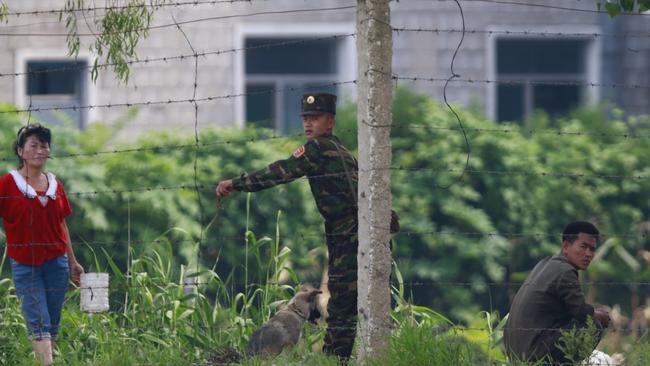
The businessman’s father moved to Dandong as a soldier when he was a boy. He set up a business selling clothes, shoes and other household goods to North Korea. The goods are not on the UN sanction list, but he says his business still has been hit by the general cutback in trade with North Korea.
While Trump complains China is not doing enough to enforce the sanctions, locals insist the measures are biting.
“President Xi is very resolute and very tight in carrying out the sanctions,” the businessman says.
“There is some smuggling but it is very small and if people get caught by the border patrol there is very strict punishment.”
Business slumped when Kim took over after the death of his father, Kim Jong-il, in December 2011. At its peak, the businessman says, about five or six years ago, the bridge to North Korea was full of trucks day and night.
The younger Kim’s erratic behaviour and nuclear testing have led to a deterioration in Chinese trade with North Korea.
The businessman says he once dealt with a business run by a military official who had links with Kim’s estranged older half-brother, Kim Jong-nam, but after Jong-nam was assassinated at Kuala Lumpur airport in February last year the North Korean contact disappeared and that part of the businessman’s trade dried up.
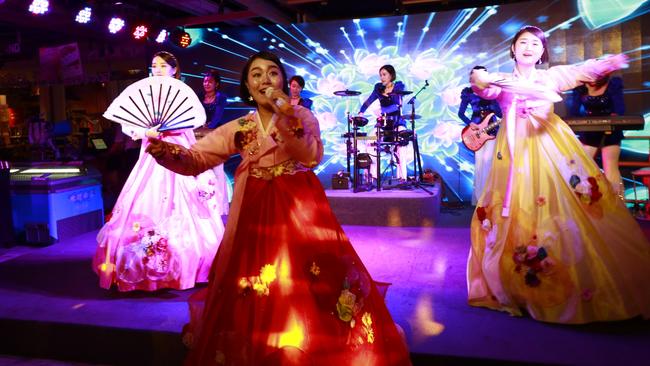
Like many we spoke to in Dandong, he holds little hope of North Korea opening up and Kim agreeing to get rid of his nuclear weapons.
“It’s impossible,” he says. “Kim has learned from (Muammar) Gaddafi in Libya and Saddam Hussein in Iraq. If he gives up nuclear weapons he will end up dead. He will not do it.”
He points out that Kim has a Western education from a boarding school in Switzerland.
“He combines his Western knowledge with a tradition of feudalism,” he says. “He is just playing for time, to delay things so he can consolidate his grip on power.”
He says businesspeople are battle-hardened to Dandong’s changing fortunes. He plans to step up another arm of his business that supplies Chinese labour to Singapore.
Our guide around Dandong was born in the city and stayed there for many years hoping that one day it would become a thriving hub of trade with a more open North Korea. But he has since moved to Shenyang, capital of Liaoning province, where there is more work. He, too, expresses doubt for a peaceful opening up with North Korea.
Dandong is a city of rumours and spies. “Sometimes in Dandong, you just feel what’s going on,” our guide tells us.
A source says the Chinese government has cleared a big area on the edge of town, near a new tourist attraction that claims Dandong has a piece of the Great Wall. The area could be used as a camp to house up to 100,000 refugees if North Korea is attacked.
The Australian meets another businessman, Li Cheng (not his real name), an exporter of medicines and medical equipment to North Korea for more than 10 years.
“The latest sanctions by Trump are the most severe,” he says in his empty office. “China has never been so sincere in carrying out the sanctions. In previous times, China was quite loose with the sanctions. “Though my products are not on the sanction list, the business still dropped by half, as the purchasing capacity of North Korean companies has been largely reduced. Many other companies with products on the sanction list have had to close their business.”
He says the largest truck dealer in Dandong has closed since the sanctions tightened.
Li says he mostly sells vaccines, antibiotics and deworming tablets across the border.
“The medicines show that North Korean people are not in good health condition.” he says. He is also pessimistic about North Korea opening up. “Back to the Kim Jong-il era, it was often said (that North Korea would open up), but it never happens. A free country conflicts with Kim’s family rule and power succession.”
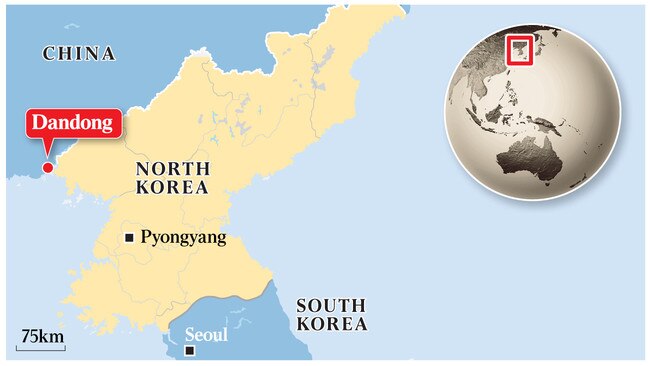
The most expensive monument to their pessimism is a bridge a few kilometres south of the Friendship Bridge. It was built by the Chinese following visits to China in early 2011 by Kim Jong-il.
Looking a little like San Francisco’s Golden Gate Bridge, it is a tribute to Chinese engineering. Built at a cost of more than $US320 million and finished in 2013, the four-lane bridge ends in farmland on the North Korean side and has never been used.
A town created near the bridge is now a combination of completed structures and other half-finished “rotten tail buildings” with large tracts of cleared land surrounded by plastic sheeting.
Tourists in Dandong have a happier time. The city is connected to Beijing by a fast train, capable of speeds of more than 300km/h. An hour’s drive north of the city, along a winding road filled with stalls selling fresh peaches, is a popular tourist spot on a lake.
We take a boat trip that goes over to the North Korean side, allowing the well-dressed Chinese tourists to get a glimpse of their much poorer neighbours.
On the North Korean side, we see fishermen sitting by the lake, with lines out or working their nets. People ride bicycles and motor bikes, and a bullock pulls a cart with a farmer on board.
Our guide on the boat says a women’s prison is on the other side. The occasional Korean fishing and work boat passes not too far away from ours. Guard towers overlook the scene, along with soldiers standing on the banks.
Chinese tourists we meet say they feel sorry for North Korea as it is so much poorer than their country.
A Dandong woman who is taking her out-of-town friends on the boat says she sees more lights on across the border these days. “China gives North Korea electricity for free,” she says.
But a former Australian diplomat says: “As soon as night falls, all the lights across the river in North Korea go dark.”
In Dandong one night we get a glimpse of a big reception hall on the North Korean side lit up for a few hours in blue and purple.
Lights also appear from construction sites, including 10-storey office buildings.
A recent report from Associated Press said a mini building boom has taken place in the city ahead of Sunday’s celebrations.
The other topic of conversation in Dandong is property prices, which have soared this year on the news of meetings between the North and South Korean leaders and the Singapore summit.
A longer-term development is Moon Island, in the middle of the Yalu River, which has eight 30-storey towers of luxury apartments.
Describing itself as an “international health resort island” and a “never-ending border pearl”, it also boasts a bilingual kindergarten and a 24-hour shopping mall.
It claims one of its designers is a Japanese architect who worked on St Vincent’s Hospital and the Children’s Hospital in Sydney.
The saleswoman says only 300 units are left out of a total of 1000 units bought by Dandong residents, as well as by out-of-towners looking for a summer retreat or to rent out to tourists.
She quotes a price of about $2000 per square metre for apartments ranging from 90sq m to 340sq m, with views into North Korea. But Dandong’s future relies on China’s ties with North Korea. And that may depend as much on the US President as it does on the Chinese leader.
“America’s strategy is clear: extreme pressuring (of North Korea),” says Zhang Liangui, a professor at China’s Central Party School. “If the extreme pressure fails, US will take military action. North Korea is facing the last opportunity to solve the nuclear problem.”

